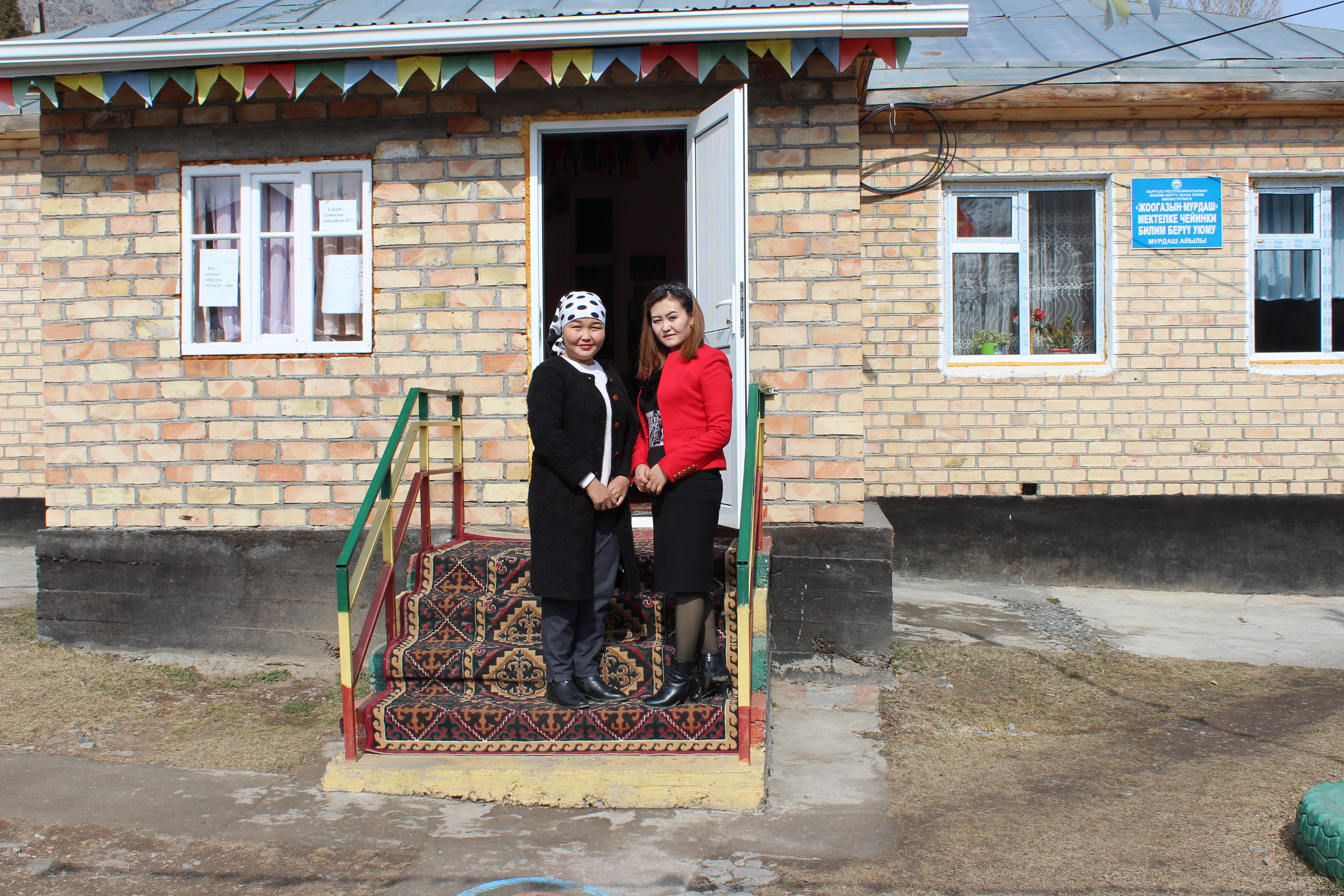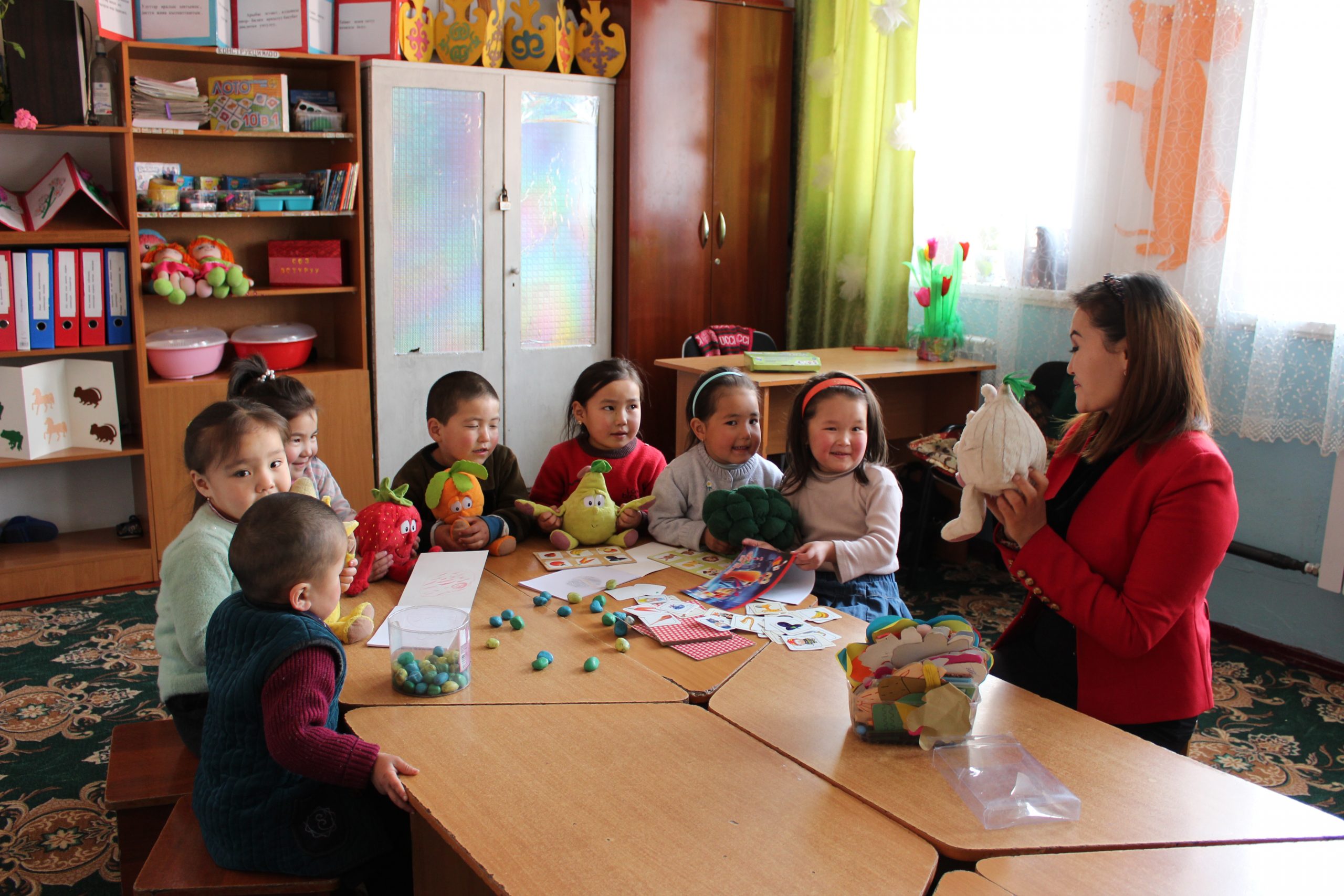“I love working with children because I feel like I’m making a difference in their lives. There is nothing more rewarding than supporting children to explore, learn and develop.” says Gulbarak Akynbek Kyzy, who has worked as a teacher at Kindergarten “Zhoogazyn-Murdash” for the last eight years in the village of Murdash, in the Osh oblast of the Kyrgyz Republic. Gulbarak has been teaching for some 18 years, since graduating with a Masters of Education from Osh State University. In that time she has broadened her knowledge and honed her expertise by completing numerous training and professional development courses, particularly focused on early childhood development.
“Every day I do my best to be a good teacher because being a part of the development of a child carries great responsibility and rewards.” she explained. “However, I believe that teachers alone cannot address all of a child’s developmental needs and that the meaningful involvement of parents is essential. In our kindergarten, parental engagement is a big challenge due to the fact that the vast majority of parents are in migration and children are left behind with their grandparents or other relatives.“
Addressing this challenge became her goal during the Human-Centred Design workshops that her school has been involved with as part of the Schools2030 programme. Her idea – for parents to connect with children and their classmates via videolink to read them stories – aims directly to address not only students emergent literacy skills and social emotional learning, but also the bond with their parents that is fundamental to the early childhood experience in so many ways.
Watch the video to hear Gulbarak herself explain the innovation, which was recently screened at the Schools2030 Global Forum, and read the interview with her and mother, Zheentayeva Guldana, below.
Thank you so much for taking the time to meet with us Gulbarak. How long have you been facilitating this storytelling initiative? Has there already been many sessions?
We have held several sessions so far. During those sessions, children were happy that, despite the distance, they can read and discuss different children’s stories with their parents. After two sessions, children started attending the kindergarten with pleasure. Children feel connected to their parents. As a result, they’ve become more active, motivated and engaged in learning! Conflicts among children have also decreased.
What response have the children had when seeing their parents via video link?
During the first session, a child of the parent who read the book became emotional. Seeing his emotions, tears came to my eyes. After the lesson, this child felt so proud that his mother read a story and facilitated the whole lesson. It was very emotional. Now after several lessons, children react with less emotions but so much attention.
How does this initiative support the children’s improved holistic learning experience, in your view?
So far children in the target class have developed a sense of confidence, they feel proud and are so engaged when their parents tell stories and then they jointly discuss. They’ve become more focused and attentive and their vocabulary as well as communication skills have enhanced.
Children feel connected to their parents. As a result, they’ve become more active, motivated and engaged in learning! Conflicts among children have also decreased.
Would you like to see other schools and communities adopt this initiative, and if so, why?
Yes, I do! As noted earlier, it is essential for parents to be actively engaged in their children’s development and learning. But given the harsh socio-economic opportunities, more than 50% of the working-age men and women in our community are in migration either in Russia or Kazakhstan. Their children are left in the care of elderly family members such as grandparents or other relatives. For grandparents it is difficult to help children learn. Most think that it is the teacher’s sole responsibility to guide and teach children. Also, while in migration, parents are themselves worried about the upbringing of their children from afar and fear that their children’s social emotional wellbeing as well as academic performance may be severely affected.
I am sure such a concerning situation is applicable to other rural communities across Kyrgyzstan. It is a very difficult situation. Thus, I believe our solution is one great way of supporting those parents and children connect, and in this way, improve children’s learning.
I would like to tell you about one mother who also took part in the classes. Her name is Guldana. She works in Moscow as a cook in a sports school. Her daughter is my student. When we offered for her to participate she immediately agreed. So, she read a story about a rooster who fell ill and needed to eat healthy food for his recovery. Since Guldana is a cook, she showed the children the fruits and vegetables from her workplace to illustrate the story. In the kindergarten, we use only models or toys, but here she read a story using fresh fruits and vegetables [smiles]. And it was very interesting for the children. They were so engaged so that they jumped in to share their own opinions about how a rooster should be fed to stay healthy.
This is wonderful to hear, thank you Gulbarak.

Read below the thoughts of mother Guldana on her participation in the Storytelling Classes.
Please tell us about your situation, Guldana, how long have you been on migration and how often do you get to come home?
I have been living and working in Moscow for three years. I visit my children once in a year. Usually, it is in wintertime, when I take my annual leave.
What are the things you miss most about home?
I miss my children most, of course! I want to see how they grow, how they go to kindergarten or school and learn new things. Although I do my best to speak to them via WhatsApp, it is not like being near to them physically. I understand I am here so far away from them to give them better lives in future, but it is so hard for me to be away from them.
How did you find out about the storytelling initiative?
My daughter’s teacher contacted me first and shared her initial thoughts about this initiative. Although the idea was still rough, I was just amazed and so happy that I volunteered to facilitate a session to help them test their idea. The testing session went so well. Even though I was anxious, I got so much energy and children were happy. The teachers were very supportive while I was preparing for this first lesson.
What made you want to be involved?
The initiative helps to build a positive parent-child relationship by allowing you to be in the moment with your child, spend quality time together, and create an environment where a child feels comfortable to explore together with a parent. That’s why I immediately agreed to take part.
What sort of stories do you read and what are some of your favourites?
The first time it was while I was at work preparing food ingredients. So I decided to read a story about a rooster who got sick and needed help with finding the right food that would help him recover quickly. While reading the story, I improvised and used those fruits and vegetables I was cleaning to help children engage in discussions. It was so fun. The children were so active that they kept asking whether they could finish the story themselves.
What are the children getting out of this experience, in your view?
First of all, they are getting the positive experience about being in a kindergarten and learning. My mother-in-law who looks after my youngest daughter says that since this initiative started, my daughter always rushes to the kindergarten. Before she refused to go there. She also asks her grandmother to read stories so she can be better prepared for discussions.
What is the best part of the experience for you?
By shortening the distance between migrant parents and children who are left behind, this initiative helps children feel good about themselves and builds their self-confidence to do better at school and have a “can do” attitude to classroom learning. It also helps children to freely communicate and be engaged in different discussions with teachers, parents and peers. I think that this initiative is so valuable that it shouldn’t be limited with storytelling only but also include other lessons or activities focusing on important issues such as environmental protection, food and nutrition, ethics, tolerance and multiculturalism.
Thank you Guldana.
These interviews were conducted by Nazira Zholdoshbekova, Schools2030 Kyrgyzstan National Coordinator, and Farida Torobekova, Education Programme Coordinator, Aga Khan Foundation Kyrgyzstan.
